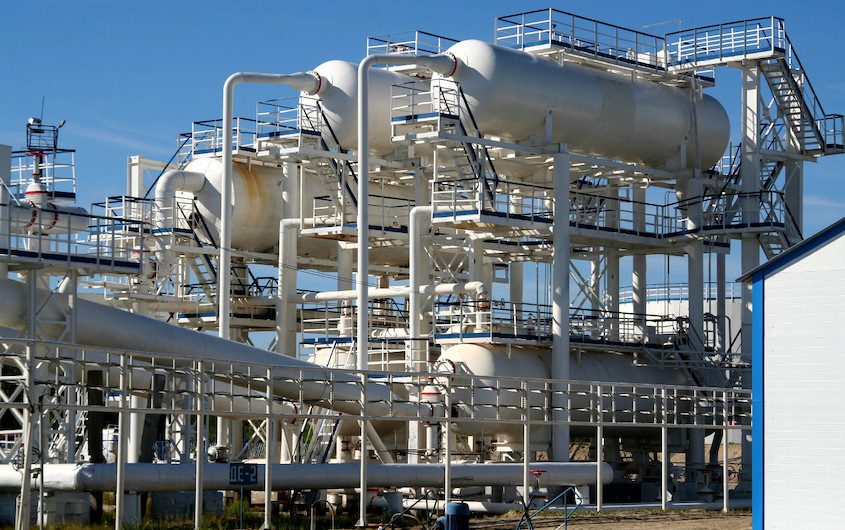
Amanda Graham via Flickr
The EU’s Old School Approach to Russian Oil

Peter S. Rashish
Vice President; Director, Geoeconomics Program
Peter S. Rashish, who counts over 30 years of experience counseling corporations, think tanks, foundations, and international organizations on transatlantic trade and economic strategy, is Vice President and Director of the Geoeconomics Program at AICGS. He also writes The Wider Atlantic blog.
Mr. Rashish has served as Vice President for Europe and Eurasia at the U.S. Chamber of Commerce, where he spearheaded the Chamber’s advocacy ahead of the launch of the Transatlantic Trade and Investment Partnership. Previously, Mr. Rashish was a Senior Advisor for Europe at McLarty Associates, Executive Vice President of the European Institute, and a staff member and consultant at the International Energy Agency, the World Bank, UN Trade and Development, the Atlantic Council, the Bertelsmann Foundation, and the German Marshall Fund.
Mr. Rashish has testified before the House Financial Services Subcommittee on International Monetary Policy and Trade and the House Foreign Affairs Subcommittee on Europe and Eurasia and has advised three U.S. presidential campaigns. He has been a featured speaker at the Munich Security Conference, the Aspen Ideas Festival, and the European Forum Alpbach and is a member of the Board of Directors of the Jean Monnet Institute in Paris and a Senior Advisor to the European Policy Centre in Brussels. His commentaries have been published in The New York Times, the Financial Times, The Wall Street Journal, Foreign Policy, and The National Interest, and he has appeared on PBS, CNBC, CNN, NPR, and the BBC.
He earned a BA from Harvard College and an MPhil in international relations from Oxford University. He speaks French, German, Italian, and Spanish.
Over the last two years, the European Union has innovated in a remarkable fashion to strengthen both its internal and external roles as an economic actor. As the EU struggles to reduce its dependence on Russian oil imports, it needs to draw inspiration from these fresh achievements rather than rely on its limited and unwieldy powers in foreign policy.
When it comes to the EU’s domestic economic governance, the €750 billion NextGen EU recovery and investment plan agreed in July 2020 in response to COVID-19 is equaled only by the single market (1992) and the euro (2002) in terms of its contribution to the EU’s economic and financial integration.
NextGen EU is increasingly looking less like a one-off crisis response and more like a model for financing other large projects, like REPowerEU—the EU’s accelerated energy transition plans announced after Russia’s invasion of Ukraine—or for a major reconstruction plan for Ukraine itself.
In terms of the EU’s international economic role, the European Commission has proposed an “anti-coercion instrument” to deal with predatory economic behavior like China’s ongoing ban on imports from Lithuania after it allowed Taiwan to use that name rather than “Taipei” for its representative office there.
Other efforts to boost the EU’s geoeconomic role include an anti-subsidies regulation and an international procurement instrument, both of which aim to counter a country like China if it leverages its state power to create an unlevel playing field in the global economy.
Given this record of EU policy creativity to enhance its economic statecraft, it is surprising that it is relying on its underdeveloped powers in foreign policy to reduce its energy dependence on Russia. Because the member states are dominant in this policy area, the EU needs to reach unanimous approval of its currently preferred approach—an embargo on imports of Russian oil by the end of this year. With Hungary unwilling to join the embargo, the EU is faced with a stalemate.
Fortunately, there is another way, one that would avoid the embarrassing need for unanimity and that would further strengthen the EU’s economic statecraft: a tariff or tax on Russian oil imports.
Given the EU’s record of policy creativity to enhance its economic statecraft, it is surprising that it is relying on its underdeveloped powers in foreign policy to reduce its energy dependence on Russia
The EU has already drawn on trade policy to respond to Russia’s invasion of Ukraine, first by revoking Russia’s so-called “most favored nation” trading status in tandem with the G7 and then by eliminating all tariffs on imports from Ukraine for one year.
While it is likely that EU law would, in fact, require unanimity to impose tariffs on Russia’s energy sector, the same would not be true if each member state imposed a national tax on Russian oil imports. If these taxes were aligned among the 26 EU countries willing to go along, they would de facto act as a tariff.
There are several advantages to an import tax/tariff compared to an embargo.
First, it could essentially be imposed right away, which is important as Russia continues to earn considerable foreign currency from its exports of oil to the EU.
Second, for structural and geological reasons it may not be easy for Russia to simply leave oil in the ground or to shift exports to other markets in response to an EU tax, which means it would continue shipping oil to the EU even at a price as low as $30-40 per barrel. Any price above that level the EU would recover in tariff revenue, which could be used to help fund REPowerEU or Ukraine’s reconstruction.
Third, since a tax would not cut off Russian oil from one day to the next, it would allow time for market participants to adjust. Once that adjustment is well underway, the tax rate can be increased.
To wean itself from Russian oil, the EU should play to its geoeconomic strengths rather than its foreign policy weaknesses.








